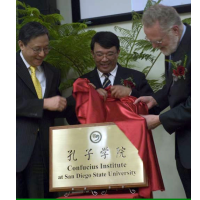U.S. Universities Help Chinese Dictatorship Spread Propaganda
 (photo: San Diego State University)
(photo: San Diego State University)
American universities of all sizes and pedigree have been helping China spread its propaganda to college students through Chinese-government-funded programs known as Confucius Institutes (CIs).
Since 2004, China has funded CIs around the world, including throughout the United States’ system of higher education. The institutes, which provide Chinese language and cultural studies, can be found at prestigious private schools like Stanford and the University of Chicago and at public colleges like San Diego State, the University of Nebraska-Lincoln and Middle Tennessee State.
Why are so many four-year institutions accepting CIs?
Money.
China subsidizes the programs, and in return, the Chinese government dictates what can—and cannot—be taught at the CIs.
At the University of Chicago’s CI, school officials don’t even dare hang a photo of the Dalai Lama, whom the Chinese government considers a threat because of his Tibetan independence views.
“CIs are managed by a foreign government, and accordingly are responsive to its politics,” Marshall Sahlins wrote at The Nation.
“The constitution and bylaws of CIs, together with the agreements established with the host universities, place their academic activities under the supervision of the Beijing headquarters of the Chinese Language Council International, commonly known as Hanban,” Sahlins added.
Hanban is ruled by Communist Party officials back in China, and is essentially “an instrument of the party state operating as an international pedagogical organization,” according to Sahlins.
At smaller U.S. universities hosting CIs, most or all of the instruction in Chinese language and culture is under Hanban’s control.
“Hanban has the right to supply the teachers, textbooks and curriculums of the courses in its charge; it also names the Chinese co-directors of the local Confucius Institutes. Research projects on China undertaken by scholars with Hanban funds are approved by Beijing. The teachers appointed by Hanban, together with the academic and extracurricular programs of the CIs, are periodically evaluated and approved by Beijing, and host universities are required to accept Beijing’s supervision and assessments of CI activities,” Sahlins wrote.
And if a university’s CI does something not authorized by Hanban, it can sue in U.S. court for breach of contract.
There are currently 400 CIs worldwide, in addition to nearly 600 “Confucius classrooms” set up in secondary and elementary schools. To date, there has been “no serious…journalistic investigation” into the program, according to Sahlins.
-Noel Brinkerhoff
To Learn More:
China U. (by Marshall Sahlins, The Nation)
China’s Brutal Past Haunts the Present: First Lady Sang to Murderous Troops; Boy Sent Mother to her Death (by Noel Brinkerhoff, AllGov)
United States-China Economic and Security Review Commission (AllGov)
- Top Stories
- Unusual News
- Where is the Money Going?
- Controversies
- U.S. and the World
- Appointments and Resignations
- Latest News
- Musk and Trump Fire Members of Congress
- Trump Calls for Violent Street Demonstrations Against Himself
- Trump Changes Name of Republican Party
- The 2024 Election By the Numbers
- Bashar al-Assad—The Fall of a Rabid AntiSemite






Comments